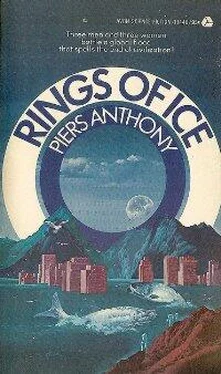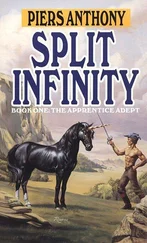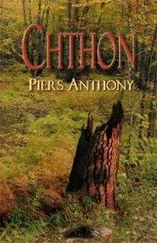She wished she could go outside. But she had to content herself with doing calisthenics for health.
Thatch ranged more widely in his search for supplies. He reported that the rain was now eroding the forest land, forming huge new gullies. The paint had been scoured from the outside of the bus.
One day, about a month into Mindel, he came back shaken. “I found their other camp,” he said.
“The attackers?” Zena asked.
“Yes. They had a home base about five miles from here, shored up with rocks. For their women and children.”
Zena felt the ugly, familiar chill. “Children?”
“They had too little food, inadequate shelter. They’re gone now.”
“Children!” Zena exclaimed. “They wanted the bus for the children!”
Thatch nodded. “It looks as if there were six men, five women, and six children of different ages. I saw their skeletons.”
“Skeletons!”
“They were out in the open. Their roof had collapsed, maybe after they were dead. The wild animals, the rain.
“They must have needed the bus more than we did!”
“They attacked us!” Gus said. “What could we do?”
“If I had known,” Zena said.
“They could have talked to us,” Floy said. “We might have taken the children—if they had only asked. But they came instead to rape and kill. So what happened, happened.”
And that was true. There had been occasion for negotiation, when Gloria fetched water for the first man. But the others had cared only for deceit and violence—and had paid the awful price. And Gordon was dead.
The Biblical forty days of the first rain had passed, but this time there was no abatement. Their carefully rationed meat diminished; what they did not eat rapidly enough, the fungus did. There was no hope of lasting out Mindel on their present supplies.
“Only two ways to eat,” Gus said. “First, go out and kill more people…”
“That isn’t even funny,” Zena said. But she was as concerned as any, for the baby inside her was growing large.
“Second, we have to go fishing again.”
And those strange, vicious fish would now be much larger and more irritable, and the constant storm would make the job several times as hard. But what else was there?
They thrashed it out and decided. Gus would stay behind in the bus, for it could not be driven now. Zena would come, and Floy, and Foundling; Dust Devil would stay with Gus.
“Remember, Gus,” Karen said. “If the bus is taken over, they’ll throw you out in the rain.”
Gus nodded. He looked terrified, and Zena felt perverse sympathy for him. Some people were afraid of rain, others of sex. A lot could be tolerated when its exact nature was appreciated. Not understood, not condoned, but tolerated, and that was sufficient.
Still, it was ironic that awkward Floy, who could have stood guard well, was coming to haul on the net while big strong Gus, afraid of being alone, would stay behind.
The complete net was far too bulky to carry, so Thatch fitted a smaller section in his pack. Any fish at all would be better than none.
The descent was horrendous. This was the first occasion Zena had been out for any extended trip since Mindel began falling, and the rain was much stronger than before. She found it hard to breathe, feeling as though she were under water. It was foggy, too, so that visibility was further limited. Not only was the footing treacherous, the landscape had changed drastically. Erosion gullies had become minor canyons. Loud torrents of water smashed down the mountain. It was impossible to cross these; they could toss whole trees about and sunder them unnoticed. A puny human body would be instantly lost.
Karen put her mouth to Thatch’s ear and yelled something. Thatch nodded agreement. He unwound the coil of rope he carried and went to each of them in turn, looping it about their middles. He hesitated before Zena, and she knew why: he was afraid of injuring the developing baby. “If I die, it dies too,” she yelled. “That’s the point of this whole expedition. Tie the rope!”
So he tied it, still doubtful. They went on, linked like mountain climbers: Thatch in the lead, Karen second, Floy third, and Zena at the rear.
As they descended, the mist became thicker in patches, seeming to flow down in rivers of its own. At its worst, it obscured everything beyond a few feet. They had to go slowly, because it was possible to step into a slippery gully they could not get out of.
Even so, the scenery was phenomenal. Sheer canyon walls loomed, seeming taller than they were because the mist shrouded the upper reaches. Zena was sure the rain could not have made these so quickly; they must be faults in the structure of the mountains, formerly hidden, now exposed by the washing away of the covering dirt and gravel.
Yet not everything had been scoured. The fungus and mildew and moss—whatever the stuff was that she had noted during the dry period—had now multiplied fantastically. The lower and partially sheltered regions were thick with mushrooms. Zena did not know whether the nutrients in the alien water fertilized this explosive growth, or whether the plant growth thrived on sediments from the catastrophic erosion, but thrive it did. Branches and trunks of trees were coated with moss, in some cases inches deep; rocks were transformed into greenish mounds; and even portions of the ground had become a resilient living carpet. The stuff was slippery when squashed, so that she was always afraid of falling. It had a vile smell when bruised.
But Thatch had explored all this region thoroughly, noting the changes as they occurred, and he knew where he was going. Zena was appalled in retrospect, now that she saw the immensity of the ongoing changes. Thatch could have been killed any one of those days of exploration, leaving the others in the bus helpless. No one, however brave or strong, could hope to survive long here without the kind of knowledge Thatch had evolved.
No, not quite true, she reminded herself. Karen had come out here, and Floy. Still, why had none of them told her about this?
She knew the answer to that too. Because they had not wanted to worry her. Because of the baby.
They stepped down into a stream bed. There was very little water here, and Zena wondered why. Most other channels were raging torrents. Then they came to a fault traversing it, and she understood: all the rushing water was being diverted into the lower crevices, leaving this one comparatively high and dry. But woe betide whoever fell into one of the nether reaches!
They stepped carefully over the cross-fault, hearing the roar of subterranean rapids, smelling the spray from the river. The ground shuddered here, making Zena fearful that the entire section of rock on which they walked would momentarily break off and plunge into that awful abyss.
Her pregnancy had turned her into a silly weak woman. She would have to do something about that!
Then a scramble up a rocky incline, under a lone tree that clung to its diminished plot of earth, and down another crevice. For a moment the fog lifted, owing to some peculiarity of the draft, and Zena could see where they were going. It was like a landscape of Mars, with holes like craters and faults like crevices. Or perhaps more like Venus, considering the cloud cover.
Thatch stopped abruptly. “Oh-oh,” he said. “Something new.”
At first Zena did not see what he meant. Then she smelled stronger fumes, something like burning sulfur. And felt warmth—not the mild warmth of the rain, but of a furnace.
Hot steam was issuing from a vent in the nearby rock. It hissed like an irate dragon.
“That was not here two days ago,” Thatch said worriedly.
“Is this a volcanic area?” Karen asked.
“No.”
Zena felt the unpleasant prickle of fear run up her back. “How can it be hot, if—” But she was able to answer that herself. “The subterranean rock is always hot. If a fissure reached down far enough—”
Читать дальше










